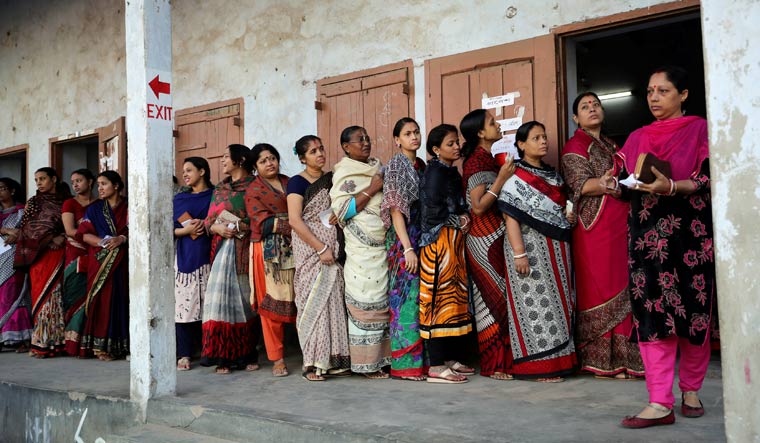Bangladesh Sunday deployed electronic voting machines for the first time in a general election, though only on a limited scale, a move which received mixed responses from the voters amid reports of glitches in some booths.
Out of the 299 parliamentary constituencies that went to polls, six saw the use of electronic voting machines (EVMs), a regular feature in neighbouring India since decades ago.
Voting for the 11th national election began with the machines being used in the six seats selected through lottery. These are: Dhaka-6, Dhaka-13, Chattogram-9, Rangpur-3, Khulna-2 and Satkhira-2. The six seats comprises over 2.1 million voters. The results from these six seats could be announced within hours after the voting ends, Bangladeshi media reported.
Electronic voting machines created problems across different voting centres in Dhaka-13 and Dhaka-6, slowing down voting process and leading to long queues, the Daily Star newspaper reported.
Voters in some areas have reported facing trouble when the machines could not recognise their fingerprints, the media.
Dhaka-13 voter Jagat Dashi Mondol, a septuagenarian, was smiling as she came out of the polling centre at Mohammadpur's Borabo Government Primary School.
When asked about how she felt using an EVM, said, "easy, very easy."
The polling centre's Presiding Officer Jayanta Chandra Deb said he replaced three EVMs when they stopped working.
Nazrul Islam, a retired engineer, said his fingerprint was not matching when he went to vote at the polling centre in Lalmatia Mohila College.
"But I got to vote using my voter ID. It didn't take much time."
Gazi Hossain, a former librarian of Lalmatia Mohila College, was unhappy with the EVM because of the time wasted in trying to match his fingerprint in the machine. "It wasn't matching, so it took more time, that's a problem," he said.
Bimal Chandra, a retired teacher, voted using EVM at the Mohammadpur Chand Community Centre.
"I just pressed two buttons on the EVM. One on the poll symbol, then another on a green button. It takes roughly ten seconds. It takes more time to be marked on the thumb with ink.
"It takes just 20 minutes to count the votes from EVM centres. This is good," said Chandra.
On December 27, the Election Commission organised mock voting at selected polling centres to educate voters on how to use EVMs.
The EVM technology is being used for the first time at the national election level, eight years after being introduced in local government elections in the country.
The machines were first used in the Chittagong City Corporation election of June 2010. However, the Election Commission stopped using the technology in 2015 due to some errors. The machines were later reintroduced in the Rangpur City Corporation election in 2016.
During this year's city corporation polls, EVMs were used in three polling centres in Khulna City Corporation with 10,000 voters; two centres in Sylhet City Corporation with 5,413 voters; 11 centres in Barishal City Corporation with 25,000 voters; and two centres in Rajshahi City Corporation with 3,383 voters, the Daily Star reported.
During the Election Commission's electoral dialogues, most of the 40 registered parties, including the Bangladesh Nationalist Party of former premier Khalida Zia and its allies, opposed the idea of using EVMs in the election.
However, five political parties, including the ruling Awami League of Prime Minister Sheikh Hasina, its allies Workers Party of Bangladesh, Jatiya Samajtantrik Dal faction led by Hasanul Haq Inu and Bangladesher Samyabadi Dal (M-L) and Zaker Party supported the use of EVMs.
The BNP has all along been opposing the EC move, alleging that this might facilitate "the government's plan for election engineering".
The Bangladesh Machine Tools Factory (BMTF) imported parts of the EVMs and assembled them in Bangladesh ahead of the general election, media reports said.
"The EVM fingerprint scanner will be imported from America while Apple will supply the monitors. Other parts of the EVM machine will be imported from different countries," the Dhaka Tribune quoted Brig Gen Mohammad Saidul Islam, director general of the Election Commission's National Identity Registration Wing, as saying in September.


